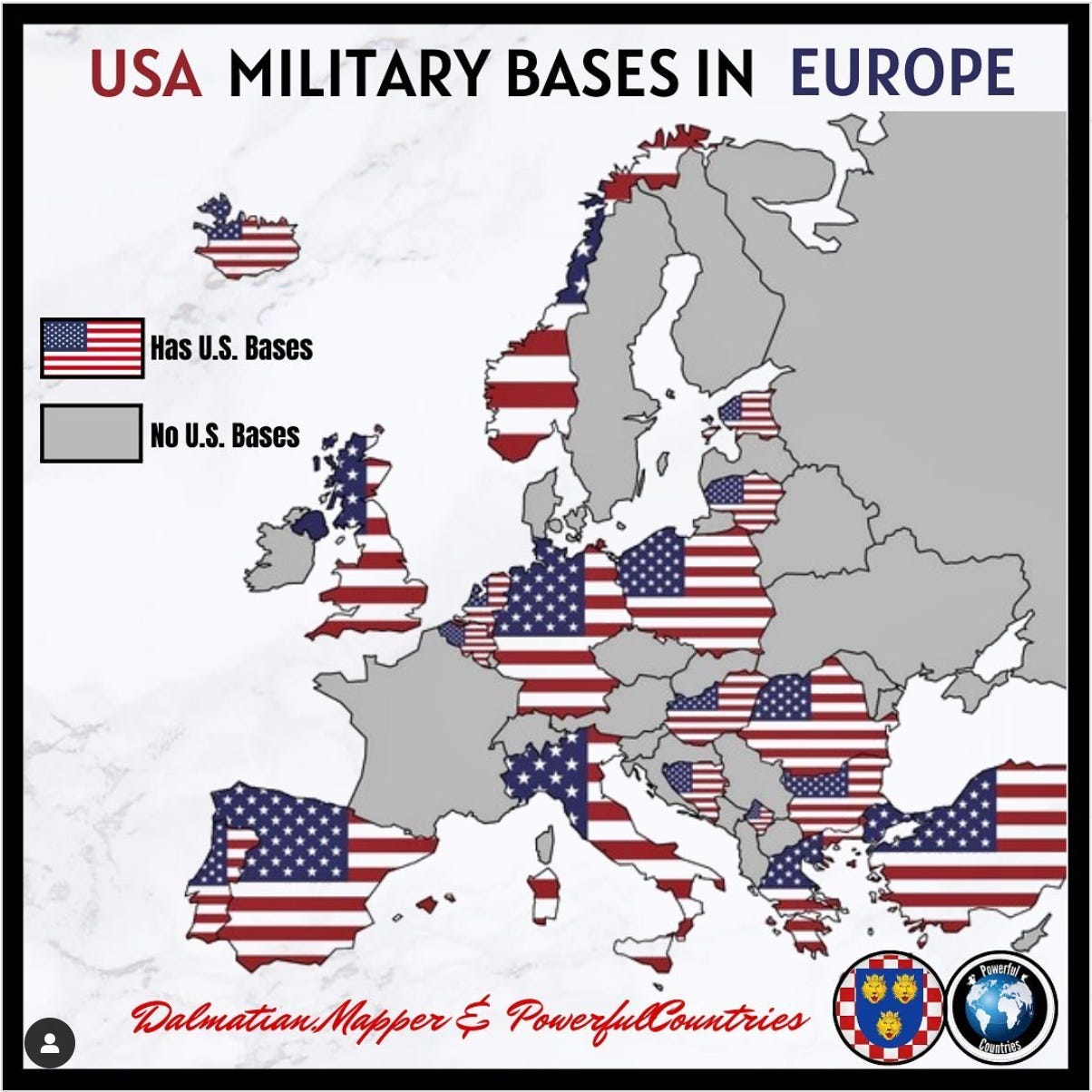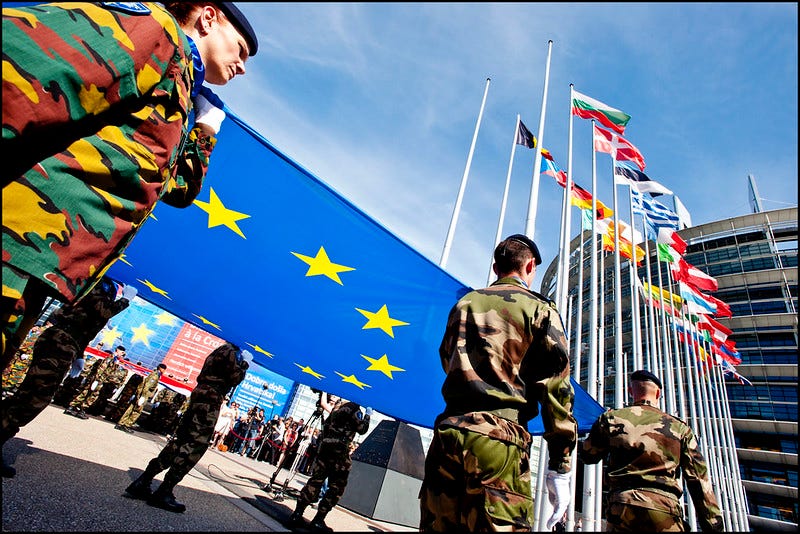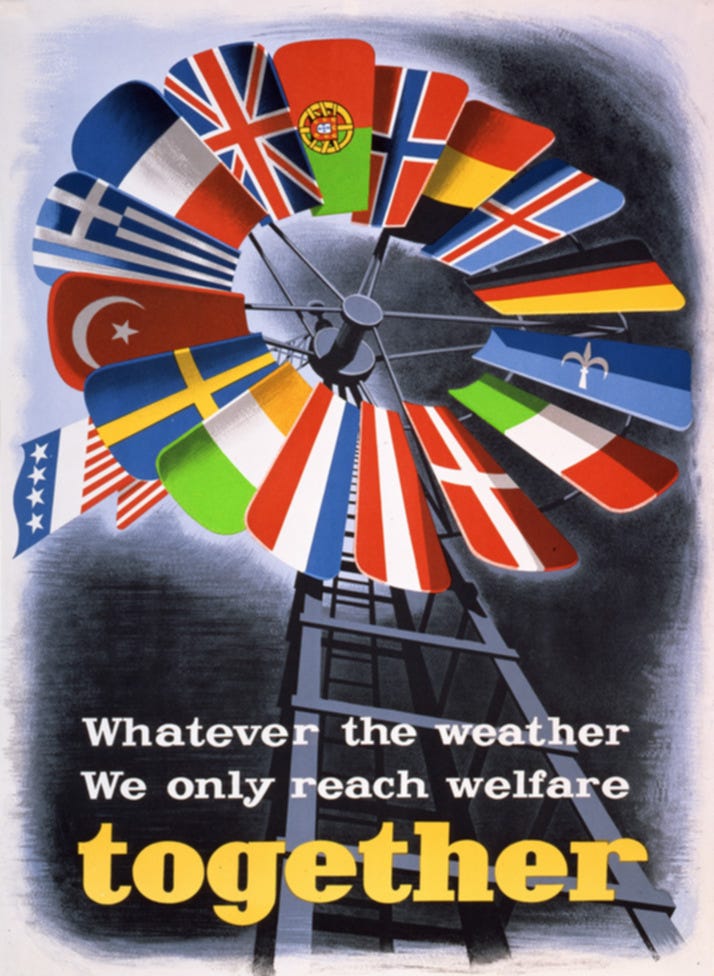Europe should trash failed Atlanticist ideologies
Even after Donald Trump said he would “encourage” Russia to invade NATO countries, the usual voices – especially in the UK – are still insisting NATO should be the only defence game in town.
Donald Trump sent shock waves through Europe this weekend when he said at a campaign rally in South Carolina that not only would he not defend NATO countries against a Russian invasion, he might actually encourage Russia to invade them if they’re not spending enough on defence.
In a (most likely made up) story about his time as president, Trump told the crowd that at a summit in Europe “one of the presidents of a big country stood up and said, ‘Well, sir, if we don’t pay and we’re attacked by Russia, will you protect us?’ I said, ‘You didn’t pay. You’re delinquent.’ He said, ‘Yes, let’s say that happened.’ ‘No, I would not protect you. In fact, I would encourage them to do whatever the hell they want’.”
Trump has long signaled, since his campaign in 2016, that he would not automatically honor the NATO article five mutual defence clause if a member were attacked. Last year it emerged that while in office Trump explicitly told EU Commission President Ursula von der Leyen that he would not come to the defence of EU countries if they are attacked – something she shamefully kept to herself until her commissioner from France revealed it. Trump’s advisors say that he plans to withdraw the US from NATO if he returns to power (prompting the Congress to last year pass a provision saying he would need congressional approval to do so, though experts say this isn’t constitutionally enforceable). But this weekend’s comments go much much further, because what Trump is saying is that not only would he not defend NATO countries, he could actually collude with Russia in their invasion.
The response from Biden, Democrats and European leaders was appropriately panicked. President Biden called the comments “appalling and unhinged.” NATO Secretary-General Jens Stoltenberg said "Any suggestion that allies will not defend each other undermines all of our security, including that of the US, and puts American and European soldiers at increased risk." Democrats are now scrambling to put new congressional limits on presidential power over NATO, now that they realize that Trump could still destroy the alliance even without pulling the US out. “Everyone should be scared as hell,” said Senator Chris Van Hollen.
Heads still in the sand
But the reaction of so many European leaders show that they still just don’t get it. Even after condemning Trump’s remarks, Stoltenberg added: "I expect the US to remain a strong and devoted ally of NATO, whoever wins the presidential election." Charles Michel, who chairs the European Council of the 27 national EU leaders, tweeted: “Reckless statements on NATO’s security and Art 5 solidarity serve only Putin’s interest. They do not bring more security or peace to the world. On the contrary, they reemphasise the need for the EU to urgently further develop its strategic autonomy and invest in its defence.” But then his next sentence seemed to negate the previous one, when he added, “And to keep our Alliance strong.”
The whole point is that the alliance is clearly not strong, and that is why the EU needs to urgently develop defence autonomy. These leaders that have spent the last eight years insisting, despite all evidence to the contrary, that NATO is strong and the US remains committed, have lost all credibility. And now they are still insisting, as Stoltenberg put it, that "I expect the US to remain a strong and devoted ally of NATO, whoever wins the presidential election."
This is the type of Atlanticist, head-in-the-sand talk that has gotten Europe into this mess. European leaders have downplayed Europe’s military dependence on America, portraying NATO as an “alliance” rather than what it actually is, a protectorate. National leaders have not been open and honest with their citizens about how reliant they are on the United States, particularly in the most dependent countries such as Germany, Italy and Belgium. Historically there have been more active duty American soldiers in Germany than there have been active duty German soldiers. If we were talking about the Roman Empire, we know what we would call such a state. But how many Germans know the extent of the American military’s continued presence in their country? And how many in Poland and the Baltics know the extent to which American troops are swarming into their territory at the moment? And more importantly, do they understand the sovereignty implications of this invitation by their governments? There are no European bases or soldiers on US soil.
Giorgia Meloni, who for all her faults has a habit of stumbling upon truths other leaders are not willing to say, put it well when she told the Italian parliament last year: “Freedom has a price and if you are not able to defend yourself, someone else will do it for you - but they will not do it for free. They will impose their interests, even if they differ from yours, and I don’t think this was ever good business for anyone.”
That America imposes its interests on Europe, however, is not the most urgent concern of the moment. This has been the situation for 75 years, and during the Cold War Western Europe made the decision that surrendering sovereignty to Washington was worth it in order to be protected from the Soviet Union. That calculation may have been useful at the time, but the Cold War ended 30 years ago. What has Europe been doing since then? They’ve been slashing defence budgets, and only deepening their military dependence on America - while at the same time lessening their economic dependence by building the European Union.
The most urgent concern at the moment is not that America is here, but that suddenly it won’t be. It now looks certain that Trump will be the Republican nominee for president, and polls show him neck-and-neck with Biden, with one outlier poll even putting him ten points ahead. To say Trump is hostile to Europe is an understatement. He and most of the Republican Party want, at the very least, to stop sending money and weapons to Ukraine. And this isn’t even close to the worst case scenario for liberal-democratic Europe. Trump has now spelled out the worst-case scenario: an authoritarian America invites Russia to invade the European Union, and the EU is unable to defend itself because it has built its defence around American support (NATO). As Politico noted in a piece today that is hard to disagree with, Trump has now made that possibility so glaringly obvious that the Atlanticist establishment that has guided European foreign policy for the past decades can no longer delude themselves. These people have been desperate to convince themselves, and us, that Biden’s return meant everything has gone back to normal – and there was no need for Europe to make itself militarily sovereign. “It almost doesn’t even matter if he wins reelection at this stage; Europe is on its own,” wrote Mathew Karnitschnig. “The only real question the election will resolve for Europe’s security is the timing of NATO’s collapse.”
“The truth is, Europe was lulled back into a false sense of security by Biden’s warm embrace,” he writes. “Even if Europe does wake up to the realities it faces, it may well be too late. On paper, Europe, with collective military spending about triple Russia’s and an economy many times its size, should be able to fend for itself. The problem is that Europe is running out of time. Replacing the American capability NATO would lose without the U.S. would take decades and untold billions. And most European leaders haven’t even accepted the cold reality that American protection is already effectively gone.”
France was right, Britain and Poland were wrong
The delusion and denial has for the past decades been strongest in Eastern Europe and Britain. When Macron and French leaders before him insisted that the EU needs to build a military component to make it capable of self-defence, Atlanticist thought leaders in Britain and the EU’s East screamed about an “EU army” that would undermine NATO. London and Warsaw have for years stood in the way of efforts to build EU defence – as has Washington (something that Trump and others always leave out). Washington’s lecturing of European countries to spend more on defence, while insisting that this spending should remain in a context where Europe relies solely on America (NATO) for its defence, was never going to work. There’s no point in spending more if the fundamental problem, European defence being oriented around American coordination, remains.
During the Trump years and after, Atlanticists in Eastern Europe kept insisting that Trump didn’t really mean what he was saying – and if he did, it didn’t reflect the thinking of the Republican Party. That is clearly delusional. Over the past days, most of the Republican Party has defended Trump’s remarks. Senator Marco Rubio, after telling new Polish Prime Minister Donald Tusk to shut up and stop criticizing Republicans blocking aid to Ukraine, insisted that Trump is merely using this language to motivate Europeans to spend more on defence. Senator Lindsay Graham said yesterday: “To the [current] prime minister of Poland, I could care less what you think.” Yet, perversely, former Polish Prime minister Morawiecki from the far-right PiS party just voted out of government responded by telling Europeans to stop criticizing the United States. PiS, which prides itself on being fanatically anti-Russian, is still in bed with a Republican party in which Putin is admired and Russian aggression is encouraged.
The same Atlanticists that got Europe into this mess are now warning the EU not to embark on building a defence union because it wouldn’t be ready in time for a Trump presidency. It is a long-term task that would be more expensive and less secure, we’re told. There are two flaws to this reasoning. One is that they don’t see to understand that this isn’t a choice, it’s an imperative. The American protectorate is leaving, one way or another, and there is a very real possibility the United States will no longer be Europe’s ally. The question is only when. The choice is therefor not between US or European defence, but rather a choice been acceptance or denial. The other flaw to these arguments is that this is not a zero sum game. EU common defence can be built as a pillar of NATO, creating an actual alliance with two independent pillars – the EU (plus UK) and the US - capable of independent action. That is a transition, not a sudden abandonment of NATO. I haven’t heard anyone suggest immediately kicking out the thousands of US soldiers based in Europe. Yes, that pillar cannot be built in one year. But you have to start somewhere, and the longer you wait the more difficult and expensive it will be when the EU is eventually forced to do it (if it isn’t too late and there’s still an EU left).
Over the past days there have been promising signs that the scales are coming off peoples’ eyes even in the most Atlanticist countries. The new government in Poland is not delusional on this subject like the previous one was. "These are the words of a serious candidate for president so they should be treated seriously," Polish Deputy Foreign Minister Paweł Zalewski told Politico. "If we do that, then it means a change to the logic of the US presence in NATO. It is very worrying. He correctly calls on member countries to spend more on defence, but he also calls on Russia to attack. This is completely incomprehensible."
Unfortunately I didn’t see Trump’s comments get much media attention in Britain – almost as if it has nothing to do with them because they aren’t in Europe. As far as I know, the government hasn’t been asked to comment on the implications of these comments and Foreign Minister David Cameron has been allowed to get away with his boilerplate language about NATO needing to be strong. Perhaps this will change in the coming days but who knows, that island seems to be floating in a realm detached from reality these days.
The initial momentum toward EU defence which came after Russia’s invasion of Ukraine in 2022 has since petered out, but Trump’s comments seem to be reinvigorating it. “Every minute counts to prepare ourselves to absorb the shock of a Trump election,” warned French FM Stéphane Séjourné yesterday. Germany’s Foreign Minister Annalena Baerbock said the EU “must embark on the path of a common security and defence union.” The big question is, who is going to lead this push? The same Atlanticists from Britain, Germany and Eastern Europe who fought so hard for so long to maintain the status quo? Or the French politicians and thought leaders who warned about this for so long and have now been proven right? If you’re a passenger in a car that has been driven into a ditch, you do you trust more to drive you out – the original driver, or a new one?
I know nobody wants to hear it, but France should be in the driver’s seat here. Yes, France is an imperfect messenger to be delivering this message. Not without reason, the country is generally distrusted in Europe and the refrain you usually hear is, “In the end, France only cares about itself.” There are suspicions that what Macron really means by European Sovereigntism is actually just replacing American hegemony with French hegemony, much like France’s purported championing of multi-lingualism is really about replacing English with French as the European Union’s common working language. But however much the latter may be true, it is illogical to think that France could even aspire to military dominance of Europe. That’s 200-year-old thinking (on a continent where memories are long). Old prejudices are preventing many in the British, German, Nordic and Eastern foreign policy establishments from seeing the merit of the only real European solution to the risk of American collapse that anyone has put forward.
Time for Europe to grow up
Atlanticism may have served Europe well in years gone by, but those days are long over. However, the mindsets and institutions have lived on well past their 1992 expiration date. Atlanticism has been the widely-accepted driving force in Europe for so long that it seems people can’t even imagine a world without it. Its proponents warn that even questioning it is dangerous, especially in the context of the Ukraine War, which they say is proof of why their ideology is the correct one. They portray it as a zero-sum game, pretending that Sovereigntism means Europe turning its back on America when in fact it means changing the protectorate relationship into an alliance of equals - an alliance Europe would be free to leave at any point. They will tell you that it means Europe embracing China or Russia instead, apparently unable to grasp that Europe is not a child that will always need protection from someone. They will tell you that the Ukraine invasion proves that Europe was right to continue embracing Atlanticism, refusing to even contenance that an expanding American military alliance was more threatening to Russia than an expanding EU defence union ever would have been.
And they will roll their eyes as they tell you European Sovereigntism is an old French obsession going all the way back to De Gaulle that the French would be banging on about whether America was a reliable partner or not. This is perhaps the argument I find most strange. Even if there weren’t questions over the risk of American collapse or disengagement, even if there wasn’t a military threat from Russia, why wouldn’t European Sovereignty be an ideology worth embracing on its own merits? Are Europeans really content to have their fate decided by a handful of voters in Iowa? Do they not feel embarrassed when they have to surrender to Washington time and time again when European legislation threatens American interests? As Meloni said, protection doesn’t come for free. For the sake of their own dignity, would sovereignty not be a worthwhile thing for Europeans to pursue regardless of current circumstances?
If Atlanticism had been ditched or adjusted years ago, and the roof was fixed while the sun was shining, Europe would not be in the extremely vulnerable situation it finds itself in at the moment. Facing an aggressor to the East, Europe finds itself reliant on a foreign power to the West that at any moment could either collapse or have a new regime that makes a deal with Russia and throws Europe to the wolves. Europeans should think about how we got here. And they should not be repeating the same mistakes of the past two decades. These Atlanticist voices, and the ideologies they espouse, should not be listened to any more.
Nowhere will this be more important than when it comes time to choose the new Commission president, Council chairman and NATO secretary-general later this year. Will Europe go with the same tired, cautious Atlanticist voices? Or will they go with leaders who have new ideas of European sovereignty and have their heads fully out of the sand? Do we need another von der Leyen, Michel or Stoltenberg? Europe needs realistic and courageous leadership. How about a President De Croo, Chairman Draghi and Secretary General Séjourné, for instance? It’s time for new thinking.








